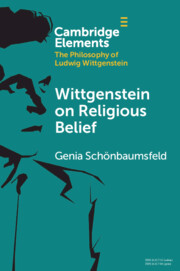Element contents
Wittgenstein on Religious Belief
Published online by Cambridge University Press: 18 January 2023
Summary
- Type
- Element
- Information
- Online ISBN: 9781009276061Publisher: Cambridge University PressPrint publication: 02 February 2023
References
- 17
- Cited by

